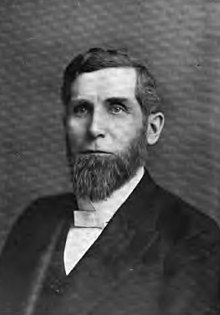Silas C. Swallow
|
Silas C. Swallow D.D. |
|
|---|---|

Silas C. Swallow c. 1904
|
|
| Born |
Silas Comfort Swallow 5 March 1839 Wilkes-Barre, Pennsylvania |
| Died | 13 August 1930 Harrisburg, Pennsylvania |
| Resting place | Paxtang Cemetery |
| Other names | the "Fighting Parson." |
| Occupation | minister |
| Spouse(s) | Rebecca Swallow |
| Parent(s) | George and Sarah Swallow |
Silas Comfort Swallow (March 5, 1839–August 13, 1930) was a United States Methodist preacher and prohibitionist politician who was a lifelong opponent of slavery.
He was presumably named after Methodist preacher Silas Comfort (1803–1868), a courageous anti-slavery member of the Genesee, Oneida and Missouri Conferences. While serving in St. Louis, Missouri, Comfort admitted as evidence in a church trial the testimony of a Negro, a practice which was forbidden in public trials in Missouri at the time. He was censured by his Conference, but that censure was overturned by the 1840 General Conference. The General Conference then bowed to Southern pressure and passed a resolution prohibiting the testimony of Negroes in church trials within states that forbade such testimony in public trials. That resolution was rescinded in 1844.
Silas Comfort Swallow was born of staunch Methodist parents. His father George was a trustee of Wyoming Seminary. Before entering the ministry, Silas was employed as a school teacher and later studied law. He served as a lieutenant during the American Civil War.
He entered the Baltimore Conference in 1863 and became a charter member of the Central Pennsylvania Conference upon its organization in 1869. He was reportedly an eloquent and forceful preacher and revivalist. He was eminently successful as a church builder, presiding elder, and editor of The Central Pennsylvania Methodist. In the latter position Swallow vigorously attacked alcohol, spiritual indifference, and corruption in state government. His enemies led a campaign to have him prosecuted and convicted of slander, which verdict was later reversed by the State Superior Court.
...
Wikipedia
